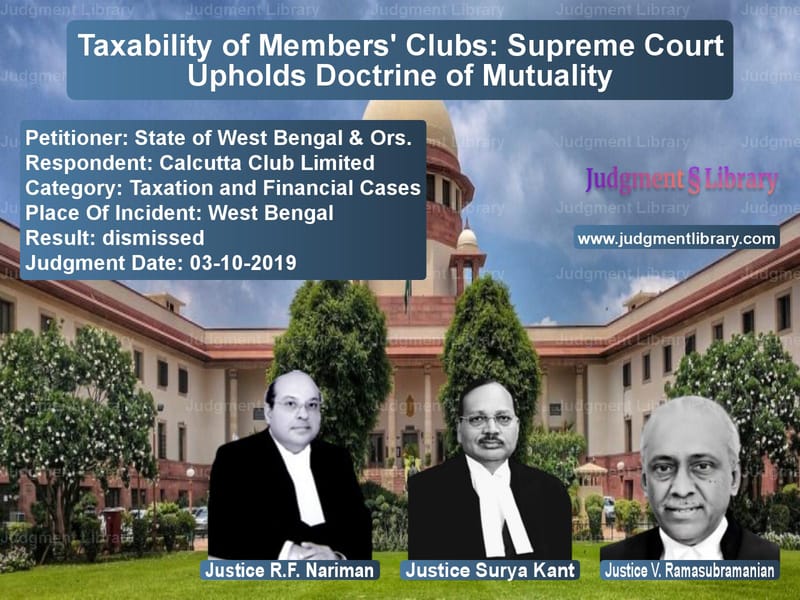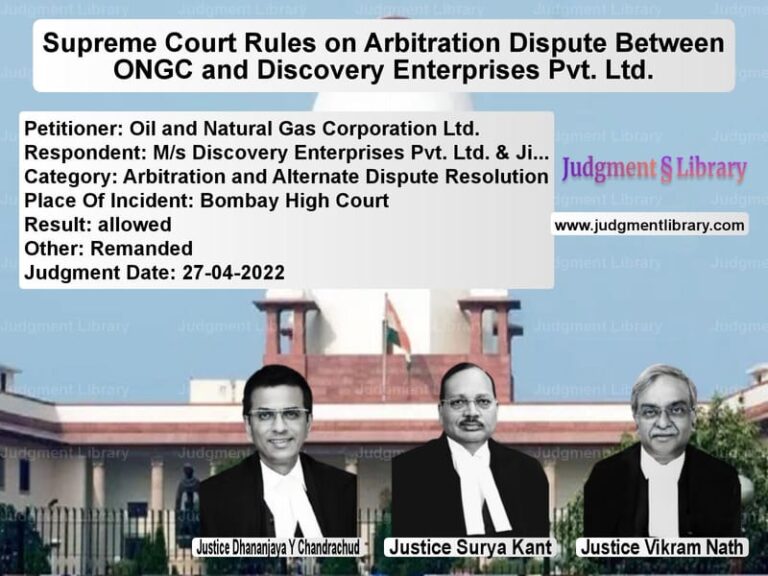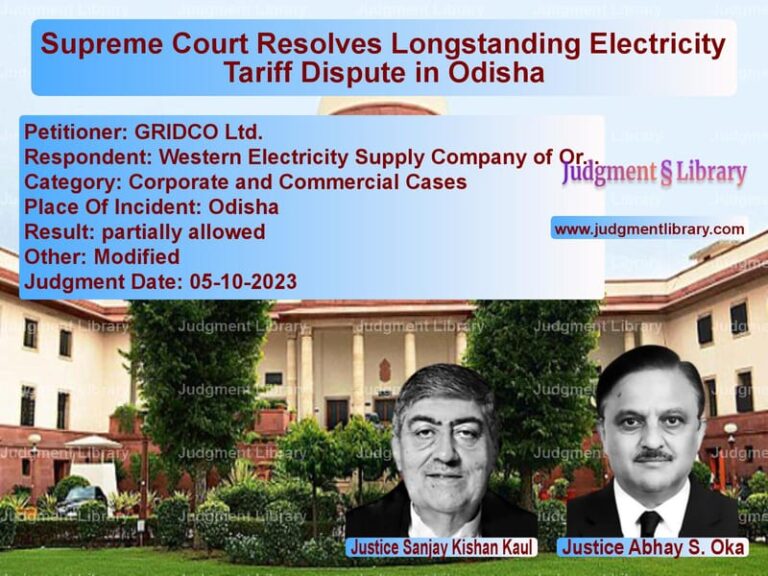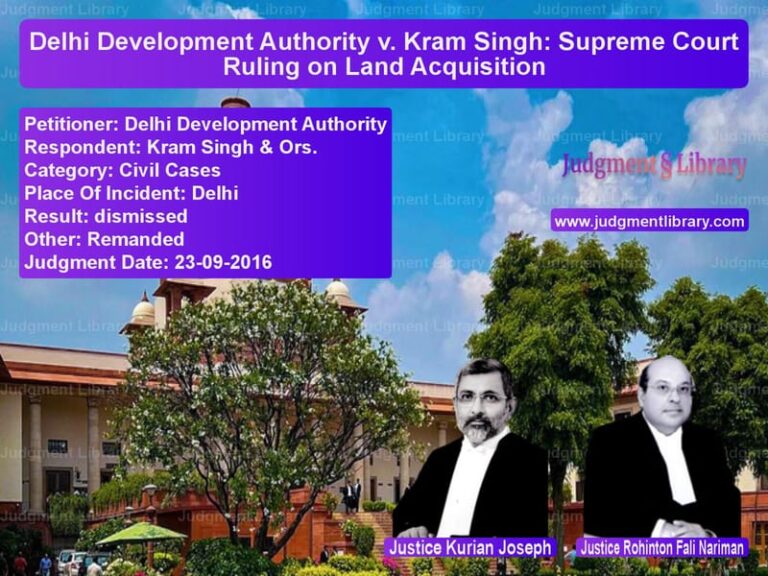Taxability of Members’ Clubs: Supreme Court Upholds Doctrine of Mutuality
The case of State of West Bengal & Ors. vs. Calcutta Club Limited and other connected appeals involves the issue of whether sales tax and service tax can be levied on transactions between members and their clubs. The case highlights the principles of the doctrine of mutuality, which states that one cannot sell or provide services to oneself.
Background of the Case
Tax Demands on Clubs
The dispute arose when tax authorities sought to impose sales tax and service tax on supplies of food and beverages by clubs to their members. The tax authorities argued that such transactions constituted a ‘sale’ or ‘service’ under applicable tax laws.
Legal Challenge by Clubs
Various clubs across India, including the Calcutta Club and Ranchi Club, challenged the tax demands on the ground that under the doctrine of mutuality, transactions between a club and its members could not be classified as a sale or service, as the club and its members were not distinct entities.
High Court Rulings
Several High Courts ruled in favor of the clubs, holding that sales tax and service tax could not be levied on supplies made by clubs to their members. Dissatisfied with these rulings, tax authorities filed appeals before the Supreme Court.
Legal Issues and Arguments
Arguments by the Tax Authorities
- The 46th Amendment to the Constitution introduced Article 366(29-A)(e), which allowed taxation of supplies by unincorporated associations to their members.
- Clubs, whether incorporated or not, should be considered separate entities from their members.
- The definition of ‘service’ under the Finance Act, 1994, was broad enough to cover services provided by clubs to their members.
- The doctrine of mutuality should not apply to incorporated clubs, as corporate entities are legally distinct from their members.
Arguments by the Clubs
- The doctrine of mutuality prevents the taxation of transactions between a club and its members.
- Article 366(29-A)(e) applies only to unincorporated associations and not to incorporated clubs.
- Sales tax and service tax laws require two distinct entities for a taxable event, which is not present in transactions within a club.
- The service tax provisions in the Finance Act, 1994, did not explicitly override the doctrine of mutuality.
Supreme Court’s Observations
On Sales Tax
The Supreme Court reaffirmed the doctrine of mutuality, holding that transactions between a club and its members cannot be classified as sales. The Court cited the landmark ruling in Young Men’s Indian Association, where it was held that members collectively own the club’s assets and, therefore, supplies by the club to members do not constitute a transfer of ownership.
The Court further observed:
- “There is no sale of food, beverages, or goods by the club to its members as the members themselves own the club’s assets.”
- “The doctrine of mutuality continues to apply to incorporated and unincorporated members’ clubs after the 46th Amendment.”
- “Article 366(29-A)(e) does not override the principle that a person cannot sell goods to oneself.”
On Service Tax
The Supreme Court ruled that service tax was not applicable to transactions between a club and its members, as there was no provision explicitly overriding the doctrine of mutuality in the Finance Act, 1994. The Court held:
- “Service tax is levied on transactions between two distinct persons. A club and its members are not distinct entities.”
- “The Explanation 3 to Section 65B(44) of the Finance Act, which deemed unincorporated clubs and their members to be separate, does not apply to incorporated clubs.”
- “Incorporated clubs remain outside the service tax net under the pre-2012 and post-2012 service tax regime.”
Key Takeaways from the Judgment
- Doctrine of Mutuality Applies: The Supreme Court reaffirmed that the doctrine of mutuality continues to apply, and transactions between a club and its members are not taxable.
- No Sales Tax on Clubs: Sales tax cannot be levied on supplies made by a club to its members, as there is no transfer of ownership.
- No Service Tax on Clubs: Service tax is not applicable to members’ clubs, whether incorporated or unincorporated.
- Clarification on Article 366(29-A)(e): The provision applies only to unincorporated associations and does not override the principle of mutuality.
- Impact on Club Operations: Clubs can continue to operate without the burden of sales tax or service tax on transactions with their members.
Conclusion
The Supreme Court’s ruling provides clarity on the taxability of members’ clubs, reaffirming the principle that a person cannot transact with oneself. The decision ensures that clubs will not be subject to sales tax or service tax on supplies to their members, reinforcing the doctrine of mutuality in tax law.
Petitioner Name: State of West Bengal & Ors..Respondent Name: Calcutta Club Limited.Judgment By: Justice R.F. Nariman, Justice Surya Kant, Justice V. Ramasubramanian.Place Of Incident: West Bengal.Judgment Date: 03-10-2019.
Don’t miss out on the full details! Download the complete judgment in PDF format below and gain valuable insights instantly!
Download Judgment: State of West Bengal vs Calcutta Club Limite Supreme Court of India Judgment Dated 03-10-2019.pdf
Direct Downlaod Judgment: Direct downlaod this Judgment
See all petitions in GST Law
See all petitions in Tax Evasion Cases
See all petitions in Banking Regulations
See all petitions in Corporate Compliance
See all petitions in Judgment by Rohinton Fali Nariman
See all petitions in Judgment by Surya Kant
See all petitions in Judgment by V. Ramasubramanian
See all petitions in dismissed
See all petitions in supreme court of India judgments October 2019
See all petitions in 2019 judgments
See all posts in Taxation and Financial Cases Category
See all allowed petitions in Taxation and Financial Cases Category
See all Dismissed petitions in Taxation and Financial Cases Category
See all partially allowed petitions in Taxation and Financial Cases Category







